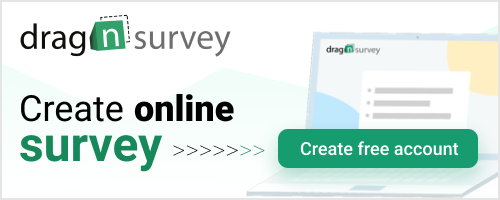Surveys are supposed to be answered but consumers tend to not enjoy completing them. And many consumers will refuse to answer questions because of poorly written questions. Bad queries can reduce the response rate and lower the value of your feedback collection exercise. Here are a list questions that won’t get answered and may lead to survey abandonment.
>> Create your Online Survey with Drag’n Survey, click here

1. What Is Your Name?
This is a simple one. Most surveys are supposed to be anonymous. People don’t want their opinions on record. They don’t enjoy giving you their thoughts normally, especially if it can be traced back to them. Therefore, you should never ask for any information that could identify them. This also includes information like:
- – What is their address.
- – What is their age.
- – What is their employee number/tax number/etc.
Some of these can be overcome with a slight tweaking. For instance, what is their age can be adjusted to a what is your age and then offering a series of age ranges for them to complete. This might get you fewer people abandoning your survey and giving you the data, you need to complete your work.
2. What Is Your Income?
Another common query that some people don’t like is to talk about is their income. Some people, especially men, can be embarrassed about the amount that they earn. This could be because they think they don’t earn enough.
You could get around this by offering a family income amount that has ranges (say $10,000 to $20,000 per annum). Many people expect these but be sure that you have a good reason to ask for this. If you’re producing a survey to test whether audiences prefer one advert compared to another, the income of the audience probably doesn’t really matter.
3. Any Question That Could Incriminate A Person
While you might have your survey completely anonymous, some people might still worry that they can be identified. Therefore, any questionnaire that contains queries which could open them up to follow up inquiries about their conduct can be challenging. It will often result in the respondent abandoning the process.
An example of this could be:
- – When you were younger, did you ever steal from a shop?
Someone might not be proud of past behavior and they might have done this. They could lie, which would give bad data. Or they could give up on the survey altogether. Other examples of this could be:
- – Have you ever not followed company policy?
- – Did you lie to secure your current position?
These questions will make some people feel very uncomfortable and you will struggle to get responses from anyone who has done either of these.
4. A Spying Question
This is a type of query where you are asking someone to report on the progress of someone else. For instance:
“What do you think of [insert name]?”
For some people this won’t be a problem and they will readily tell you all the negatives of certain people. However, other people won’t like this question. They will feel it isn’t their responsibility to speak of other people and think you’re just trying to force someone out of the organization.
Therefore, they will refuse to answer and then they will abandon the survey. They might also report your questioning to the person mentioned, this will break down trust between you and that individual.
Another problem is that some people might also give false answers in order to not upset someone. This could be more of a problem if you’re asking about the performance of a supervisor or manager.
5. Anything Else?
This question is often asked at the end of a survey, or after a specific question where someone is asked to tick the answers that are applicable but then they you ask for more information. This is an annoying question for audiences because you’ve already asked the question and received an answer. Now you’re asking for more information and the survey respondent wants to just finish.
Therefore, instead of answering the query, the respondent ignores the question and shuts down the survey. Therefore, you could have lost all the data.
You Need To Write Questions That Are Easy For Audiences To Answer
In surveys, you want to make sure that you’re giving questions that people don’t mind answering. Asking questions that are too personal, difficult or challenge their morality can often mean that a survey is abandoned, and you lose the essential data that they’ve already given you.
Therefore, check every question and ensure that you’re asking queries that are relevant, necessary and will provide you with valuable data. If you’re unsure about what you’re asking, then always seek the opinions of others. They can help you decide whether what you’ve asked is suitable or not.
More about surveys:
Turn Your Customer Feedback Into Stunning Marketing Content, click here
The Easy Way To Get Your Market Research, click here
4 Ways To Share Survey Results With Your Team, click here
How To Create Powerful Online Surveys That Get Completed, click here
Tired Of Employees Not Giving The Answers You Need – Carry Out A Survey, click here
Read the article:
French – Les questions à éviter pour avoir un maximum de réponses à votre questionnaire en ligne, click here
